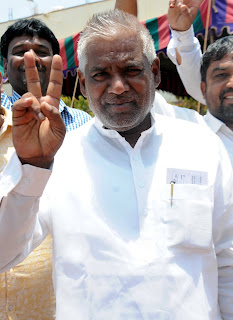Is your blood group -ve?
Some young people who met me recently, asked me these questions. I had no time then and promised to answer them here.
I will try to answer one question per day.
1: Why does the mainstream media not cover constructive social phenomenon like inter religious dialogues and efforts at communal harmony?
A: Yes and no. One of the oldest allegations against the media is that it highlights negative issues and downplays positive developments. There may be two reasons behind this. Negative issues seem to have a larger nuisance value that can create sensational news. They also have larger marketability than positive issues. Sensational stories attract attention faster than articles that demand the reader to stop, think and perceive.
However, this is an easy explanation.
A larger, academic explanation may be this. Our colonial history ridden with stories of exploitation and centuries of suffering might have shaped our psyche. May be this is responsible for our `Chalta hai’ or `Kuch Nahi Badlega’ attitudes. We tend to accept hopelessness and see hope as a rarity.
This might make us disinterested towards positive stories and make us savour the stories that speak of the dark side of man. Anything good is suspected. I know of a junior who tried to write about Salumarada Thimmakka, the iconic woman who planted and cared for hundreds of trees along the road side in a village in Kolar. His seniors were not convinced that someone ‘could be so good’. His story was not published for weeks. Then, someone else wrote the story and the rest is history. She became a celebrity overnight and went on to receive a national award.
I don’t need to give examples of negative issues. Look around you and they outnumber every other kind of a story by many times.
I don’t know of a study that has counted the number of positive and negative stories in any media product over a long period of time. However, a Mangalore University study by Shafi Saduddin revealed that during a communal riot, the number of news reports that seemed to help prolong it were more than those that could arrest it.
I will try to answer one question per day.
1: Why does the mainstream media not cover constructive social phenomenon like inter religious dialogues and efforts at communal harmony?
A: Yes and no. One of the oldest allegations against the media is that it highlights negative issues and downplays positive developments. There may be two reasons behind this. Negative issues seem to have a larger nuisance value that can create sensational news. They also have larger marketability than positive issues. Sensational stories attract attention faster than articles that demand the reader to stop, think and perceive.
However, this is an easy explanation.
A larger, academic explanation may be this. Our colonial history ridden with stories of exploitation and centuries of suffering might have shaped our psyche. May be this is responsible for our `Chalta hai’ or `Kuch Nahi Badlega’ attitudes. We tend to accept hopelessness and see hope as a rarity.
This might make us disinterested towards positive stories and make us savour the stories that speak of the dark side of man. Anything good is suspected. I know of a junior who tried to write about Salumarada Thimmakka, the iconic woman who planted and cared for hundreds of trees along the road side in a village in Kolar. His seniors were not convinced that someone ‘could be so good’. His story was not published for weeks. Then, someone else wrote the story and the rest is history. She became a celebrity overnight and went on to receive a national award.
I don’t need to give examples of negative issues. Look around you and they outnumber every other kind of a story by many times.
I don’t know of a study that has counted the number of positive and negative stories in any media product over a long period of time. However, a Mangalore University study by Shafi Saduddin revealed that during a communal riot, the number of news reports that seemed to help prolong it were more than those that could arrest it.

Comments
THe Fourth Estate seems to be becoming more corrupt much before the third estate. My basic question some times; is it journalism more an"INDUSTRY"